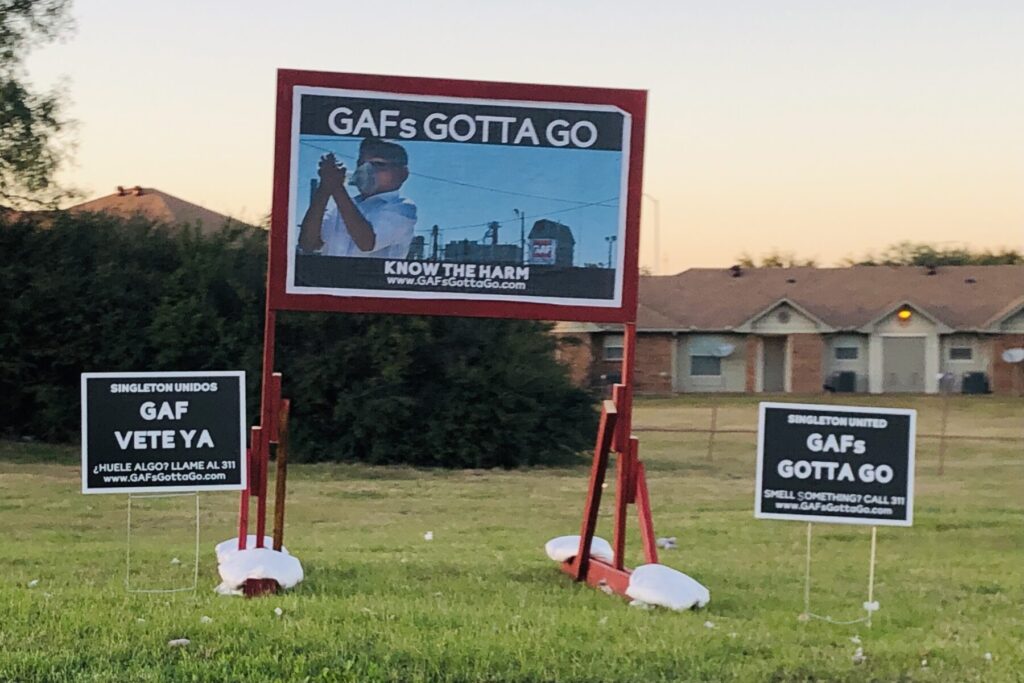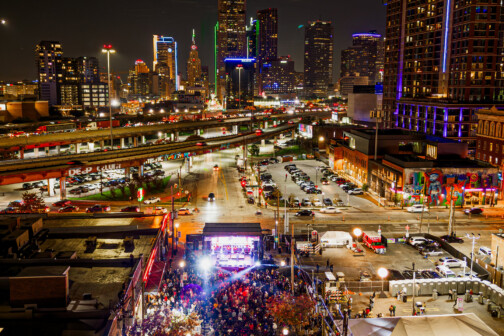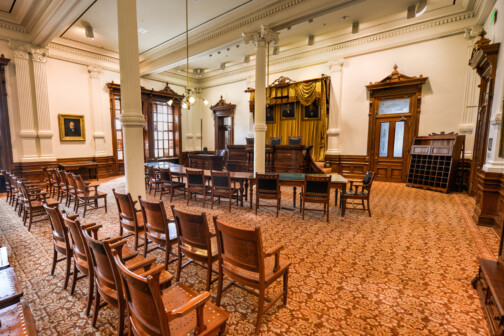Industrial polluters across the state frequently evade federal oversight by applying for licenses with the Texas Commission on Environmental Quality that are intended for lower-level polluters, a report by the Texas Tribune and Inside Climate News revealed last week.
The GAF shingle factory in West Dallas made an unsurprising appearance. In August 2022, we wrote about how the Environmental Protection Agency opposed an emissions permit that delineated the type and quantity of emissions the factory was allowed to produce. The feds were also concerned that the state did not have an adequate plan to actively monitor emissions at the plant.
At the time, GAF had applied as a major polluter because it seemed most appropriate for its operations. A 2020 inventory of local polluters by Paul Quinn College found that GAF was the highest emitter of sulfur dioxide in the city, and a group of the factory’s human neighbors, organized in a group called Singleton United/Unidos, had outlined a litany of health issues they attribute to the emissions from the factory in a white paper. The EPA asked the TCEQ to beef up the terms of the permit and explain how it would monitor compliance and record keeping.
GAF said it expected the EPA’s pushback and would “welcome” the additional requirements.
“We do not expect the EPA objections to affect the ultimate approval of our air permit. GAF will continue to operate in compliance with all existing and new air permit terms,” a company spokesperson said at the time.
Less than a month after the EPA raised its concerns, the company withdrew its application and instead filed for a new air quality permit that did not designate it as a major polluter. The TCEQ quietly approved the amended permit less than two weeks later. The new permit didn’t require EPA approval.
In a technical review of the permit revision, the company says it decommissioned a manufacturing line in 2017, which contributed to a drop in its emissions—lower than what its previous federal permit required. GAF, the TCEQ agreed, was now a minor polluter.
The new permit was a gut-punch for the community, which had rallied in 2021 and delivered more than 100 public comments voicing their opposition to the renewal of GAF’s permit. They believed (and still do) that the plant’s existence violated the federal Clean Air Act of 1990; GAF has operated in the neighborhood for 78 years. At the time, residents were happy they had at least eked out an agreement from the TCEQ to increase the frequency of emissions monitoring to once a week, up from once every three months. If they couldn’t get the permit denied outright, at least it would have sharper teeth.
Members of Singleton United and another community organization, West Dallas 1, questioned the company’s about-face. Local officials like Kathryn Bazan, who chairs the city’s environmental commission, pointed out that the state permit only enforced sulfur dioxide emissions—not other pollutants or particulate matter.
“The TCEQ’s Point Source Emissions Inventory database shows that even with the reduction, GAF will keep the title of highest sulfur dioxide polluter in all of Dallas County that it has held for many years,” she said.
The Tribune and Inside Climate News report found 10 instances where companies, including GAF, apparently circumvented federal oversight by re-classifying themselves as minor polluters. In 2022, a Sunset Commission review of the TCEQ raised concerns that the agency had given control to the industries it is charged with regulating, effectively allowing them to police themselves. It also examined whether permitting decisions and oversight provided by the agency were equitable.
“The commissioners’ lack of visibility in and ownership of TCEQ decision making has only inspired further frustration and distrust among both the regulated community and environmental advocates,” the report said.
Without robust state oversight of polluters, the onus for protecting residents falls on the city and county. For many who live next to industry, that’s not comforting. In 2022, a group of residents and environmental advocates filed a complaint with the U.S. Department of Housing and Urban Development, alleging that Dallas’ zoning and permitting practices put heavy industry—and the pollution it produces—next to Black and Brown neighborhoods almost exclusively.
“Shingle Mountain wouldn’t have happened if the land next to my home were not zoned heavy industrial,” said Marsha Jackson, who famously lived next to the ever-growing pile of rotted shingles in southern Dallas’ Floral Farms community for years.
GAF says it will be leaving the Singleton Boulevard site in 2029; the residents living near it say that is not soon enough. The company has filed a request for a zoning change. Singleton United members are now pushing for amortization, a process that would allow the city to shutter the operation. They would like the plant declared a nonconforming use that is incompatible with the changed neighborhood. But once again, they’ve hit a wall—the city attorney’s office says that new state laws require reconfiguring the amortization process. The office has introduced an amended ordinance that would remove residents’ ability to start the amortization process, leaving it solely in the hands of the City Council.
“This is not how a world-class city treats its people,” Singleton United member Janie Cisneros said at a November Zoning Ordinance Advisory Committee. “Accepting this amendment entrenches Dallas to be a city that will always be divided. This shows that the city of Dallas still has strong connections to its dark historic past.”
The matter would still need to come before the City Plan Commission at least twice, then to a City Council committee, before a briefing and a vote by the full Council.
The city could also look at where its zoning allows polluters to operate as it works to rewrite Dallas’ land use, zoning, and development codes. For instance, the West Dallas neighbors of GAF have long argued that the city should reexamine the types of operations appropriate for a residential area. The fight goes back to the 1990s when they successfully fought against a lead smelter. Along with residents in South Dallas and Joppa, they continue to fight off concrete batch plants and other polluters, too.
Ironically, much of the attention has focused on the types of appropriate buildings in single-family residential areas—specifically, whether introducing more density through duplexes, triplexes, and quadplexes should be allowed in Dallas. Equally important is discussing whether industrial uses are appropriate for residential areas and ensuring residents can safely breathe the air where they live. That means the Council will likely need to do what the state regulatory body seems unwilling to do: hold polluters’ feet to the fire.
Author






